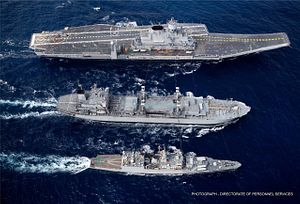India’s Eastern Naval Command hosted the navies of approximately 52 countries for five days last week for the International Fleet Review. More than 100 naval vessels participated in the review, which involves a ceremonial inspection to showcase naval readiness among other activities. Warships and sailors from the Indian, U.S., Russian, Chinese, Japanese, Australian, and South Korean navies, among others, participated.
The 2016 fleet review was held in the Bay of Bengal, off the coastal city of Visakhapatnam in Andhra Pradesh. Indian Prime Minister Narendra Modi, President Pranab Mukherjee, and Chief of Naval Staff R.K. Dhowan were in attendance. India last hosted an International Fleet Review in 2001 off the coast of Mumbai, with the participation of 29 countries. India’s naval fleet reviews occur once during the tenure of each president. This year’s review marks the 11th overall.
The United States sent a Ticonderoga-class guided missile cruiser, the USS Antietam, and an Arleigh-Burke-class guided missile destroyer, the USS McCampbell, to the fleet review. The Chinese People’s Liberation Army-Navy sent two Type 054A Jiangkai-II-class frigates, the PLAN Liuzhou and PLAN Sanya. The Royal Australian Navy sent an Adelaide-class guided-missile frigate, the HMAS Darwin. The International Fleet Review is broadly intended to build mutual trust among a wide range of seafaring nations. A full list of participating navies is available on the Indian Navy’s website.
On Sunday, Modi delivered remarks at the fleet review aboard the INS Vikramaditya, one of India’s aircraft carriers, outlining India’s interests on the global seas and the challenges that need to be addressed by global navies. Modi emphasized that the “oceans are the lifelines of global prosperity,” and that over “90 percent of global merchandise trade is carried on the oceans.” He cited a range of threats to unfettered global maritime commerce, including sea-borne terror, piracy, natural disasters, and man-made environmental disasters.
Modi additionally addressed normative themes, touching on the importance of freedom of navigation and cooperation over competition in the use of the international waters. His remarks come at a time of increased tensions in the Asia-Pacific–particularly East Asia–over maritime territorial disputes.
Modi said that India will host the first-ever Global Maritime Summit later this year, in April. According to his remarks, the summit will endeavor to “strengthen the vibrant trade/investment/technology and commercial linkages between India and other maritime nations.”

































